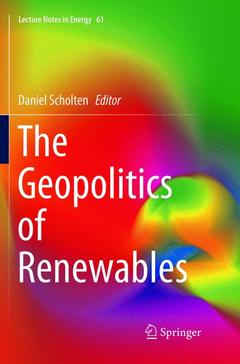The Geopolitics of Renewables, Softcover reprint of the original 1st ed. 2018 Lecture Notes in Energy Series, Vol. 61
Coordonnateur : Scholten Daniel

Renewables are a game changer for interstate energy relations. Their abundance and intermittency, possibilities for decentral generation and use of rare earth materials, and generally electric nature of transportation make them very different from fossil fuels. What do these geographic and technical characteristics of renewable energy systems imply for infrastructure topology and operations, business models, and energy markets? What are the consequences for the strategic realities and policy considerations of producer, consumer, and transit countries and energy-related patterns of cooperation and conflict between them? Who are the winners and losers?
The Geopolitics of Renewables is the first in-depth exploration of the implications for interstate energy relations of a transition towards renewable energy. Fifteen international scholars combine insights from several disciplines - international relations, geopolitics, energy security, renewable energy technology, economics, sustainability transitions, and energy policy - to establish a comprehensive overview and understanding of the emerging energy game. Focus is on contemporary developments and how they may shape the coming decades on three levels of analysis:
· The emerging global energy game; winners and losers
· Regional and bilateral energy relations of established and rising powers
· Infrastructure developments and governance responses
The book is recommended for academics and policy makers. It offers a novel analytical framework that moves from geography and technology to economics and politics to investigate the geopolitical implications of renewable energy and provides practical illustrations and policy recommendations related to specific countries and regions such as the US, EU, China, India, OPEC, and Russia
The Geopolitics of renewables - an introduction and a framework.- renewable energy game and its potential impact upon global power relations.- Frontrunners and laggers: great power rivalry, receptiveness to renewables, and industrial leadership.- Battling for a shrinking market: OPEC, the renewables revolution, and the risk of stranded assets.- US’ energy foreign policy and the energy transition.- Germany’s Energiewende in its European context - impact on energy flows, generation capacity allocation and Europe’s industrial fabric.- China’s energy foreign policy and the energy transition.
Daniel Scholten is Assistant Professor in geopolitics of renewables at Delft University of Technology. He also writes on the governance of renewable energy systems, renewable energy security, transitions to sustainability, and European integration. His research combines engineering insights on renewable energy systems with institutional economics, political science, and international relations. He has authored publications in Technical Forecasting and Social Change, Energy, Sustainability, and the Journal of Common Market Studies among others.
Dr. Scholten has been an affiliated research fellow at the Energy Programme Asia of the International Institute for Asian Studies in Leiden and a lecturer of International Political Economy at Webster University Leiden. In addition, he was the managing editor of the international journal Competition and Regulation in Network Industries between 2011-2016. He defended his dissertation on the organizational requirements of future energy systems at TU Delft in 2012 and holds degrees in Political Science (Radboud University, 2003) and International and European Relations (University of Amsterdam, 2006, with distinction).Features the first in-depth look at the geopolitical implications of a transition towards renewable energy
Provides a comprehensive overview of strategic realities and policy challenges of countries and regions such as the US, EU, China, India, OPEC, and Russia
Offers a novel analytical framework to understand the emerging energy game
Date de parution : 06-2019
Ouvrage de 338 p.
15.5x23.5 cm
Date de parution : 01-2018
Ouvrage de 338 p.
15.5x23.5 cm
Thèmes de The Geopolitics of Renewables :
Mots-clés :
Renewable Energy; Geopolitics; Energy Security; Energy Policy; New Energy Game



